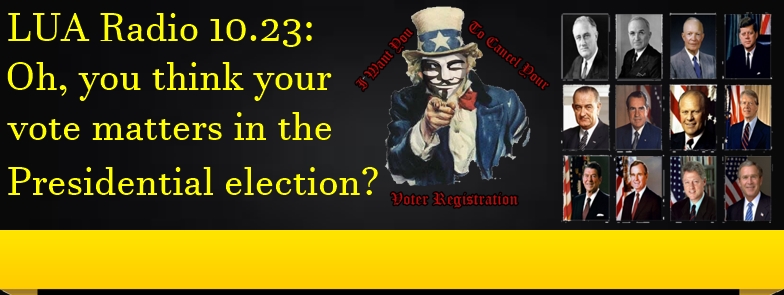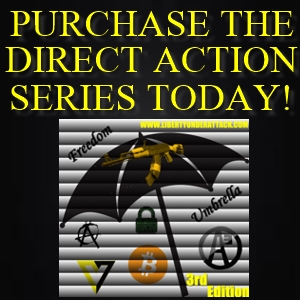LUA Radio 10.23: Oh, You Think Your Vote Matters in a Presidential Election? That’s cute.


Tonight’s broadcast of Liberty Under Attack Radio is titled, “Oh, you think your vote matters in a Presidential election? That’s cute.”
Kyle Rearden, our creative consultant, joins us to offer his thoughts and conclusions on the subjects at hand. Namely, the fact that the President is not elected by popular vote (that is, the electorate); rather, the President is chosen by the electors. In other words, your vote especially doesn’t matter in Presidential elections, although that is the one that is the most heavily focused on.
We also tell you how government officials in the other two branches of government constitutionally gain their position, and why the implications of these facts are so significant.
If you enjoyed this broadcast and appreciate the work we do, please consider contributing financially. You can make a one-time PayPal donation by clicking the image above, you can contribute via Patreon using the image below, or you can use the buttons on the sidebar to toss us some Bitcoin, sign up for a monthly contribution, gift us something off of our Amazon wishlist, or support us through our various affiliate links, such as Audible.
Show Notes:
Check out the video Kyle narrated and I produced on the subject titled, The American Political System Explained in 10 Minutes
Art. 2, Sec 1, Clauses 2-4 of the Constitution
Illinois Compiled Statutes (10 ILCS 5): http://www.ilga.gov/legislation/ilcs/ilcs4.asp?DocName=001000050HArt%2E+21&ActID=170&ChapterID=3&SeqStart=72400000&SeqEnd=73000000
The Communist State of Illinois: Voting Does Not Work an Analysis (Article by Shane)
Voting Does Not Work (Kyle’s article)
Purchase the Direct Action Series

Podcast: Play in new window | Download
Subscribe: Apple Podcasts | Email | TuneIn | RSS



By 2020, the National Popular Vote bill could guarantee the presidency to the candidate who receives the most popular votes in the country, by changing state winner-take-all laws (not mentioned in the U.S. Constitution, but later enacted by 48 states), without changing anything in the Constitution, using the built-in method that the Constitution provides for states to make changes.
Every vote, everywhere, for every candidate, would be politically relevant and equal in every presidential election.
No more distorting and divisive red and blue state maps of predictable outcomes.
No more handful of ‘battleground’ states (where the two major political parties happen to have similar levels of support among voters) where voters and policies are more important than those of the voters in 38+ predictable states that have just been ‘spectators’ and ignored after the conventions.
The bill would take effect when enacted by states with a majority of the electoral votes—270 of 538.
All of the presidential electors from the enacting states will be supporters of the presidential candidate receiving the most popular votes in all 50 states (and DC)—thereby guaranteeing that candidate with an Electoral College majority.
The bill was approved this year by a unanimous bipartisan House committee vote in both Georgia (16 electoral votes) and Missouri (10).
The bill has passed 34 state legislative chambers in 23 rural, small, medium, large, red, blue, and purple states with 261 electoral votes.
The bill has been enacted by 11 small, medium, and large jurisdictions with 165 electoral votes – 61% of the 270 necessary to go into effect.
NationalPopularVote
Susan,
So, you would advocate for an Athenian-style direct democracy? 100% mob rule?
What about for Supreme Court justices? Should they be popularly elected too?
Both would lead to significantly worse situations. No thanks.
#AbolishTheState #GoogleVoluntaryism
Laissez-faire,
Shane
Being a constitutional republic does not mean we should not and cannot guarantee the election of the presidential candidate with the most popular votes. The candidate with the most votes wins in every other election in the country.
Guaranteeing the election of the presidential candidate with the most popular votes and the majority of Electoral College votes (as the National Popular Vote bill would) would not make us a pure democracy.
Pure democracy is a form of government in which people vote on all policy initiatives directly.
Popular election of the chief executive does not determine whether a government is a republic or democracy.